The possibility that Italy will now bring the eurozone and the world to the brink of economic disaster makes me recall my own near-disastrous brush with Italian business culture.
Twenty-five years ago, almost to the day, I started CHILD magazine. My partner, who had been the advertising director of Harper's Bazaar, knew an Italian publisher who wanted to hire her for a fashion publication he was launching in the U.S. When she told him she was committed to our project, he indicated that he was willing to fund both. I met Enrico Pistolese and his associate, Amedeo Angiolillo, at Le Cirque in Manhattan.
After a cocktail, the four of us gathered in Enrico's suite to present our "mock issue" of CHILD and our business plan. He never looked at the numbers. He simply waved his hand and said, "OK, both." We were shocked--and thrilled. By contrast, all the New York publishers we spoke with poured over our numbers, asked challenging questions, and wanted to know more. Not Enrico.
So with a tiny staff of six people, and a few freelancers, we moved into an office on Madison Avenue. Like most start-ups, we were working 24/7 on a magazine geared to a generation of baby boom parents who wanted to know more about how to help children thrive than how to cope with them. Our strategy was to focus more on the child rather than the parent and to wrap the information in a beautiful package working with great writers and photographers. We modeled our design after an Italian publication called "Vogue Bambini,” which featured wonderful photographs of children and families.
But troubling signs began to tarnish our hopes of a truly successful launch. Our art director was the first to raise the red flag. We had to ship our final layouts by DHL to Milan, where the magazine was being printed. We introduced CHILD in September of 1986 and had secured newsstand distribution. You don't fool around with newsstand dates, especially when the distributors would just as soon dump your magazine in a sinkhole rather than take the time and trouble to truck a handful of copies to some 711 in Buffalo. CHILD was as much an Italian magazine, given our publisher, as American. That's probably why we never, ever made a newsstand date.
My partner and I tried to get Enrico to focus on the breadth of the United States market and the idea of subscription marketing. In Italy, magazines were sold almost exclusively on newsstands, probably because their postal service was frequently on strike. Rochelle Udell, formerly art director of Vogue, was advising us, and she created a map of the United States and overlaid the map of Italy. The idea was to show Enrico the difference in size between the countries. Once again, he waved his hand, only this time it was to dismiss the idea that we needed to grow subscriptions.
I was beginning to think that our Italian benefactors were stuck in Italy, where doing things the way they had always been done was the only way to operate.
A few months later, our art director, who also did design work for a publication owned by The New York Times, said he saw Amedeo at The Times and heard he was selling CHILD. Luckily, our lawyer had a provision in our contract that prevented them from selling CHILD if they were in default on any of their bills. Enrico and Amedeo were in default on almost all of their bills. They never paid the printer, the shipping agent, the distributor, etc.
For our Italian backers, this was common practice. But I had the feeling that they weren't alone, and I'm more convinced than ever that Italy's modus operandi does not meet the standards set by the eurozone and other developed countries, even though it has the eighth largest economy in the world at $2 trillion.
If Italy's borrowing costs soar past the barely sustainable 7 percent rate level, the likelihood of an Italian default looms, along with a European recession chaos in world markets. But why are we surprised? Aside from fashion, food and the Fiat, what is Italy really good at?
If Prime Minister Silvio Berlusconi and his advisors had the vision to look at the complete global economic picture instead of doing business as usual, they would have known that their balance sheet was unsustainable. What happens next, though, will determine whether Italy, like Greece, really wants to play in a bigger sandbox.
My story does have a happy ending. The magazine ownership reverted to me and my partner, and we sold it to The New York Times Magazine Group. CHILD was sold twice more and was published more than 20 years before it folded in 2007.






